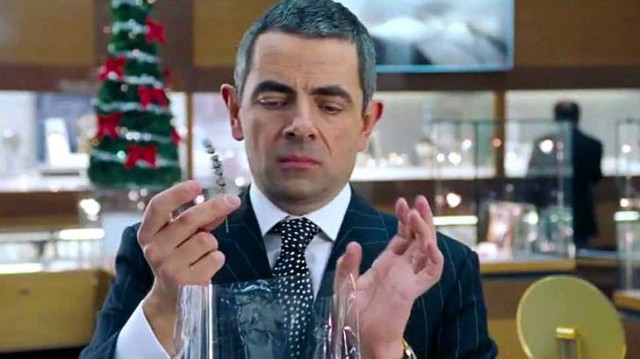Holiday Shopping Stories

When I was in kindergarten, the school had a Holiday Shopping Fair that was similar to a Book Fair except the idea was that you were supposed to buy child-budget-appropriate presents for your family. (Do schools still do this? I can’t imagine. Some of them, maybe.)
I picked a “Best Mom” figurine for my mom and a gyroscope for my dad. He would get the matching “Best Dad” figurine the next year, because who can resist the charms of the gyroscope? The way it worked was that there were one or two sample presents on display, and then the rest of them were already boxed up for our tiny child-fingers to grab. So I picked up my presents, paid something around $2 for them, and took them home.
When my dad unwrapped the gyroscope on Christmas Eve — we’re a Christmas Eve presents family — the box was empty.
It had never occurred to me that the box could be empty. I mean, I was barely six years old; the idea that you could accidentally carry home an empty box instead of a gyroscope just wasn’t part of my worldview. But I was quick to pick up on the idea of consumer responsibility: that if you’re going to bring home a present for someone, you need to check to make sure you haven’t accidentally been given an empty box. That, in the end, making sure you get what you paid for rests on you.

When I was in maybe second or third grade, my dad took my little sister and I each in turn to the general store — we had moved to a small rural town by then, and yes, it was actually called a “general store” — to buy each other a present. We picked out the exact same gift for each other: a packet of Garfield stationery. It featured a picture of Garfield with a newspaper and a coffee mug and the caption “Hey! What’s News With You?”

When I was in college, I decided to commission a piece of art for my parents. There was this art store where the owner had a couple of samples of his own work on display, and I thought they were so cool — he had created 3D figures out of layered paper, and then put them inside a shadowbox frame.
So I asked him if he could make one of those for my parents. Maybe 3D figures that kind of looked like them? He told me it would cost $150, and that was the most I had ever spent on any present for anyone in my life, it was more than my entire Christmas shopping budget, but I said yes because I felt sort of like I had to; we were already having the conversation, I had offered this man work and I couldn’t take it away.
The next day, I am extraordinarily embarrassed to report, I went back to the art store to try to cancel the project. However, he had already started working on it, and the result looked nothing like the delicate figures I had admired in his display pieces. It looked hastily put together, it only used a few layers of paper, and it was not the type of commissioned artwork that I wanted to give anyone. This was another consumer responsibility lesson, though it would take me a few more years to fully learn it: when you’re working with someone, those early steps are a negotiation. You don’t have to say yes until you’re completely sure you’re getting what you want — and you can say no, when you hear a price, and leave.

In the early days of Amazon you weren’t always sure that you’d get what you ordered. I remember ordering one CD and receiving another, or my sister and I going together on a coffee-table book about English gardening for my mom’s birthday, except the book never arrived, except that Amazon continued to insist that it had.
Now it’s easy. My parents’ address is already pre-loaded in my Amazon account, and I can track the packages online and tell my folks the day they arrive “don’t open the Amazon box, it’s from me.” Online shopping has taken the place of the used bookstores I used to trawl for 50-cent copies in nearly-new condition (because books still count as both the best presents and, often, the cheapest). It’s taken the place of going to the mall, walking to the general store, choosing from a few rows of stationery. We get to choose nearly anything we can imagine, now — which often translates into emailing my family and asking them “what do you want for Christmas?”
This year I’ll do my holiday shopping in an afternoon. Probably less than that. Someone else will do the walking and picking and shipping for me — and the shipping will be free. I love it. Not the part about the picking, because I’ve read the stories, but the part about how I can get it done so easily. I remember when we were kids we’d spend weekend after weekend trailing behind our parents, walking through shopping centers and the mall. (Do kids still do this? Some of them, maybe.)
I still owe my dad a gyroscope.
Support The Billfold
The Billfold continues to exist thanks to support from our readers. Help us continue to do our work by making a monthly pledge on Patreon or a one-time-only contribution through PayPal.
Comments